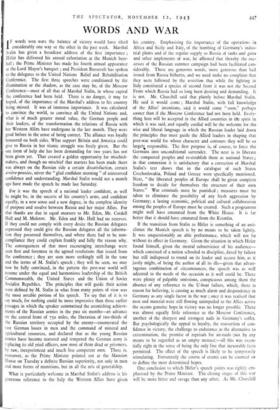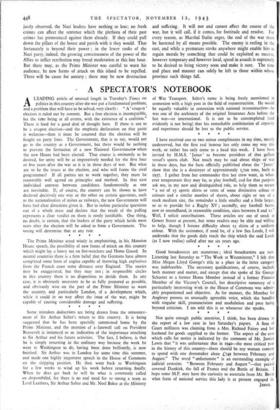WORDS AND WAR
F words won wars the balance of victory would have tilted I considerably one way or the other in the past week. Marshal Stalin has given a broadcast address of the first importance ; Hitler has delivered his annual exhortation at the Munich beer- hall ; the Prime Minister has made his fourth annual appearance at the Lord Mayor's banquet ; and President Roosevelt has spoken to the delegates to the United Nations Relief and Rehabilitation Conference. The first three speeches were conditioned by the illumination or the shadow, as the case may be, of the Moscow Conference—most of all that of Marshal Stalin, in whose capital the conference had been held. There is no danger, it may be hoped, of the importance of the Marshal's address to his country being missed. It was of immense importance. It was calculated to convince the world, to convince all the United Nations and, what is of much greater moral value, the German people and their leaders, of the transformation the relations of Russia with her Western Allies have undergone in the last month. They were good before in the sense of being correct. The alliance was loyally honoured on both sides. What support Britain and America could give to Russia in her titanic struggle was freely given. But the one form of help she has been demanding for two years has not been given yet. That created a golden opportunity for mischief- makers, and though no mischief that matters has been made there was always on the Russian side a certain dissatisfaction, certain arriere-pensies, never the " glad confident morning " of unreserved confidence and understanding. Marshal Stalin would not a month ago have made the speech he made last Saturday.
For it was the speech of a national leader confident, as well he might be, in the success of his country's arms, and confident equally, in a new sense and a new degree, in the complete identity of purpose and resolve between Russia and her major Allies. For that thanks are due in equal measure to Mr. Eden, Mr. Cordell Hull and M. Molotov. Mr. Eden and Mr. Hull had no reserves. If they could not comply with every desire the Russian delegates expressed they could give the Russian delegates all the informa- tion they possessed themselves, and where there had to be non- compliance they could explain frankly and fully the reason why. The consequences of that most encouraging interchange were seen first and foremost in the agreed resolutions that issued from the conference ; they are seen more strikingly still in the tone and the terms of M. Stalin's speech ; they will be seen, we may now be fully convinced, in the pattern the post-war world will assume under the equal and harmonious leadership of the British Commonwealth, the United States and the Union of Soviet Socialist Republics. The principles that will guide their action were defined by M. Stalin in what from many points of view was the most notable portion of his speech. To say that of it is to say much, for nothing could be more impressive than those earlier passages in which the speaker summarised the astonishing achieve- ments of the Russian armies in the past six months—an advance on the central front of 75o miles, the liberation of two-thirds of the Russian territory occupied by the enemy—enumerated the vast German losses in men and the command of mineral and agricultural resources, and declared that as the young Russian armies have become matured and tempered the German army is replacing its old tried officers, now most of them dead or prisoners, by raw, inexperienced and much less competent men. There is, moreover, as the Prime Minister pointed out at the Mansion House on Tuesday a definite Russian superiority, not only in men and most forms of munitions, but in all the arts of generalship.
What is particularly welcome in Marshal Stalin's address is his generous reference to the help the Western Allies have given his country. Emphasising the importance of the operations in Africa and Sicily and Italy, of the bombing of Germany's indus- trial plants and of the regular supply to Russia of tanks and guns and other implements of war, he affirmed that thereby the suc- cesses of the Russian summer campaign had been facilitated con- siderably. These are generous words, more generous than had issued from Russia hitherto, and we need make no complaint that they were followed by the assertion that while the fighting in Italy constituted a species of second front it was not the Second Front which Russia had so long beendesiring and demanding. It is not. Mr. Churchill said that plainly before Marshal Stalin. He said it would come ; Marshal Stalin, with full knowledge of the Allies' intentions, said it would come " soon," perhaps sooner than if the Moscow Conference had not been held. Every- thing here will be accepted in the Allied countries in tilt spirit in which it was said, and equally cordial will be the welcome for the wise and liberal language in which the Russian leader laid down the principles that must guide the Allied leaders in shaping that post-war world for whose character and contours they will be so largel4 responsible. The first purpose is, of course, to force the Germans into unconditional surrender. The next is to liberate the conquered peoples and re-establish them as national States ; in that connexion it is satisfactory that a correction of Marshal Stalin's text shows that in the catalogue of such States Czechoslovakia, Poland and Greece were specifically mentioned. Next, " the liberated peoples of Europe shall be given complete freedom to decide for themselves the structure of their own States." War criminals must be punished ; measures must be taken to eliminate the possibility of any fresh aggression by Germany; a lasting economic, political and cultural collaboration among the peoples of Europe must be created. Such a programme might well have emanated from the White House. It is far better that it should have emanated from the Kremlin.
If the transition from Stalin to Hitler is something of an anti- climax the Munich speech is by no means to be taken lightly. It was unquestionably an able performance, which will not be without its effect in Germany. Given the situation in which Hitler found himself, given the mental subservience of his audience— which consisted of a nation schooled to discipline, dazed by failure but still indisposed to round on its leader and accuse him, as it justly might, of being the author of all its ills—given that advan- tageous combination of circumstances, the speech was as well adjusted to the needs of the occasion as it well could be. There were plenty of palpable omissions, conspicuous among them the absence of any reference to the U-boat failure, which, there is reason for believing, is causing as much alarm and despondency in Germany as any single factor in the war ; once it was realised that men and material were still flowing unimpeded to the Allies across the oceans genuine hope in victory was no longer possible. There was almost equally little reference to the Moscow Conference, another of the sharpest and strongest nails in Germany's coffin. But psychologically the appeal to loyalty, the reassertion of con- fidence in victory, the challenge to endurance as the alternative to extermination, the promise of reprisals for air-raids (not by any means to be regarded as an empty menace)—all this was essen- tially right in the sense of being the only line that inexorable facts permitted. The effect of the speech is likely to be temporarily stimulating. Fortunately the course of events can be counted on to deflate the most determined hopes.
One conclusion to which Hitler's speech points was rightly em- phasised by the Prime Minister. The closing stages of this war will be more bitter and savage than any other. As Mr. Churchill justly observed, the Nazi leaders have nothing to lose; no fresh crimes can affect the sentence which the plethora of their past crimes has pronounced against them already. If they could pull down the pillars of the house and perish with it they would. That fortunately is beyond their power ; in the lower ranks of the Nazi party, indeed, the growing consciousness of the power of the Allies to inflict retribution may breed moderation at this late hour. But there may, as the Prime Minister was careful to warn his audience, be new forms of attack on this island to be repelled. There will be cause for anxiety ; there may be new destruction and.-suffering. It will not and cannot affect the course of the war, but it will call, if it comes, for fortitude and resolve. For every reason, as Marshal Stalin urges, the end of the war must be hastened by all means possible. The enemy is reeling in the east, and while a premature stroke anywhere might enable him to regain morale by something that could be exploited as success, however temporary and however local, speed in assault is supremely to be desired to bring victory soon and make it sure. The time and place and manner can safely be left to those within whose province such things fall.



























 Previous page
Previous page